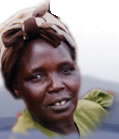 |
 |
||
 |
|||
|
RELATED THEMES conflict culture and customs land livestock social change OTHER LOCAL THEMES BACKGROUND |
identity
Most of the narrators in this collection are Sabaot, and though there are two Teso and two Bukusu narrators on this site, this theme is explored the most in the Sabaot sense of self. The Sabaot's main reference points in their identity have been land and cattle. But with the decrease in pastoralism and growing land shortages, as well some decline in the practice of certain traditions such as circumcision and polygamy, many feel that the Sabaot sense of identity is under threat. The influence of the Church has been one factor, but at least one narrator believes that intermarriage has been the main cause of change: "Bukusu had cultures which were different from ours. When you intermarry, these cultures are married" (Kenya 22) . There is some feeling that in such a "marriage" the Bukusu culture dominated: "Bukusu are very proud people who have always looked down upon the Sabaot.... I tend to think that this was because our lifestyle or way of life was very different from theirs. For example we circumcised our girls while they did not. We were also pastoralists who survived most on milk and other livestock products, while the Bukusu were farmers and their staple food came from crops. This made it possible for them to look at what they did not do as being backward and therefore despised the people who practised it" (Kenya 13) . One man feels that the Sabaot identity crisis is self-generated to an extent, because the Sabaot "are the worse imitators of foreign cultures" (Kenya 12) . He, like one or two others, believes they have an inferiority complex about their own culture. Yet clearly it is hard to maintain when, as several narrators point out, children are taught at school in Kiswahili, the national language. For this reason, and because of intermarriage, fewer and fewer people are using the Sabaot language. Written material in Sabaot is relatively rare - the booklet of these testimonies will be one of the few resources for the Sabaot community in their own language. |
|